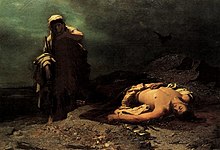
Back Antigone (Sophokles) ALS أنتيغون (سوفوكليس) Arabic Antigone (Sophokles) BAR Антыгона (Сафокл) Byelorussian Антигона (Софокъл) Bulgarian Antigona (Sofoklo) BS Antígona (Sòfocles) Catalan Antigona (Sofoklés) Czech Antigone (Sofokles) Danish Antigone (Sophokles) German
| Antigone | |
|---|---|
 Antigone in front of the dead Polynices by Nikiforos Lytras 1865 | |
| Written by | Sophocles |
| Chorus | Theban Elders |
| Characters | Antigone Ismene Creon Eurydice Haemon Tiresias Sentry Leader of the Chorus First Messenger Second Messenger |
| Mute | Two guards A boy |
| Date premiered | c. 441 BC |
| Place premiered | Athens |
| Original language | Ancient Greek |
| Genre | Tragedy |
Antigone (/ænˈtɪɡəni/ ann-TIG-ə-nee; Ancient Greek: Ἀντιγόνη) is an Athenian tragedy written by Sophocles in (or before) 441 BC and first performed at the Festival of Dionysus of the same year. It is thought to be the second oldest surviving play of Sophocles, preceded by Ajax, which was written around the same period. The play is one of a triad of tragedies known as the three Theban plays, following Oedipus Rex and Oedipus at Colonus. Even though the events in Antigone occur last in the order of events depicted in the plays, Sophocles wrote Antigone first.[1] The story expands on the Theban legend that predates it, and it picks up where Aeschylus' Seven Against Thebes ends. The play is named after the main protagonist Antigone.
After Oedipus' self-exile, his sons Eteocles and Polynices engaged in a civil war for the Theban throne, which resulted in both brothers dying fighting each other. Oedipus' brother-in-law and new Theban ruler Creon ordered the public honoring of Eteocles and the public shaming of Thebes' traitor Polynices. The story follows the attempts of Antigone, the sister of Eteocles and Polynices, to bury Polynices, going against the decision of her uncle Creon and placing her relationship with her brother above human laws.
- ^ Sophocles (1986). The Three Theban Plays: Antigone, Oedipus the King, Oedipus at Colonus. Translated by Robert Fagles. New York: Penguin. p. 35.
© MMXXIII Rich X Search. We shall prevail. All rights reserved. Rich X Search